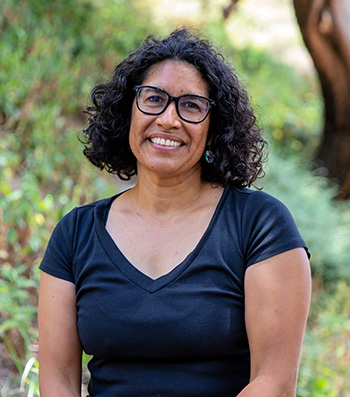Erika Zavaleta, professor of ecology and evolutionary biology at UC Santa Cruz, has been selected by the Ecological Society of America (ESA) as one of four ESA Excellence in Ecology (EEE) Scholars in the first cohort of this new initiative.
The EEE Scholars initiative addresses one of the recommendations from the ESA’s diversity, equity, inclusion, and justice task force to support and elevate diverse scientists in the ecological community.
“This effort seeks to remove critical barriers to full participation in the retention and promotion of scholars who have traditionally been excluded or underrepresented in our community to make ESA more inclusive, especially for Black, indigenous, and people of color,” said ESA President Dennis Ojima.
Zavaleta received the ESA’s 2021 Commitment to Human Diversity in Ecology Award earlier this year. Since 2015, she has directed the Doris Duke Conservation Scholars Program, which recruits a diverse cohort of students each year for experiential training in field research and conservation leadership. As a Howard Hughes Medical Institute Professor, Zavaleta launched the Center to Advance Mentored, Inquiry-Based Opportunities (CAMINO) for students in ecology and conservation programs and developed a training program for preventing sexual harassment in field biology activities.
Zavaleta’s research focuses on global change ecology, conservation justice, and addressing racial disparities in science. She studies the effects of biodiversity and climate changes on ecological and sociocultural systems, the effectiveness of conservation under rapid global changes, and the effectiveness of programs that address racial disparities in science and conservation.
Zavaleta earned her B.A. and M.A. in anthropology and a Ph.D. in biological sciences at Stanford University. She joined the faculty at UC Santa Cruz in 2003.
EEE Scholars receive an award of $5000 over two years to support travel for a speaking opportunity at an ESA annual meeting or event, to support research or family/childcare, to host a research topic web event, and for publication fees in one of ESA’s open access journals. ESA anticipates the experience will build peer support among the scholars and its alumni in addition to access to mentors.
“Ecology shows us that diversity within an ecosystem makes it stronger. Today, we take one small step to showcase the excellence of diverse ecologists in our profession. We recognize that more work is needed. ESA is committed to increasing opportunities for BIPOC ecologists. Young ecologists or those considering a career in ecology will be influenced if they see themselves represented by those in leadership positions,” said ESA Diversity Committee Chair Carmen Cid.
The Ecological Society of America, founded in 1915, is the world’s largest community of professional ecologists and a trusted source of ecological knowledge, committed to advancing the understanding of life on Earth.



